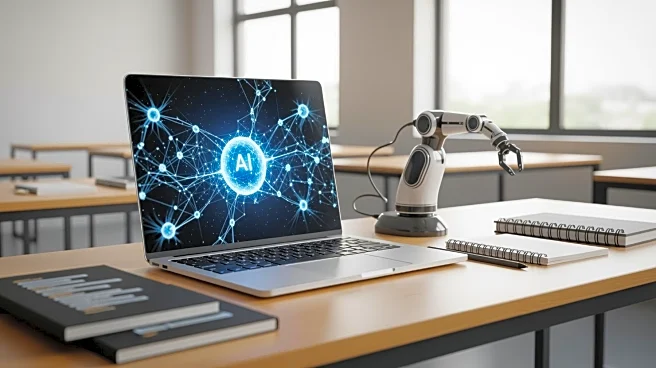What's Happening?
In South Carolina, K-12 career and technical education (CTE) programs are incorporating artificial intelligence (AI) into their curricula to prepare students for future careers. At Riverside High School in Greer, students in Calla Bartschi's Introduction
to AI class are learning to apply AI technologies in various industries, including agriculture, entertainment, and healthcare. This initiative is part of a broader effort by the Greenville County school district to develop an AI-focused CTE pathway. The program, developed in partnership with the Southern Regional Education Board, aims to equip students with AI skills relevant to industry-specific applications. The curriculum includes a four-year pathway with units on AI concepts, applications, and a capstone project, culminating in a Microsoft Azure AI Fundamentals certification.
Why It's Important?
The integration of AI into CTE programs is crucial as businesses increasingly seek employees with AI skills. This educational shift addresses the growing demand for a workforce proficient in AI technologies, which are becoming integral across various sectors. By preparing students with these skills, South Carolina's education system is positioning itself to meet the needs of industries that rely on AI for innovation and efficiency. This initiative not only enhances students' career prospects but also supports economic growth by ensuring a steady supply of skilled workers. The program's focus on adaptability, collaboration, and problem-solving aligns with the skills employers value, making students more competitive in the job market.
What's Next?
As the AI CTE pathway continues to develop, other districts and states may look to South Carolina's model as a blueprint for integrating AI into their educational programs. The ongoing development of AI-related curricula and policies will be essential to keep pace with technological advancements. Schools will need to continuously update their programs to reflect the latest industry trends and ensure students are learning relevant skills. Additionally, partnerships with industry leaders will be crucial in providing students with real-world insights and opportunities for internships and mentorships. The success of this initiative could lead to broader adoption of AI education across the U.S., influencing how future generations are prepared for the workforce.















